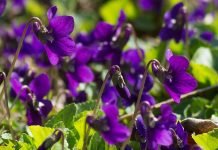Hibiscus is an excellent specimen plant for the sunny windowsill. A hibiscus is a perennial plant in the genus Hibiscus. There are a huge number of species in this genus, from dwarf herbaceous shrubs to towering trees, and these plants grow in many regions of the world. The plant with this name is often welcome in the garden because it has very large, trumpet-shaped flowers that come in an array of colors, and it sometimes also has a very delicate, pleasant scent that can be very enjoyable when a large cluster of plants is massed together. Its large papery flowers last for only a day or two, but with proper care there will be a succession of blooms from spring to fall. The flowers are attractive to butterflies and hummingbirds. Hibiscus can grow to 15 feet tall in frost-free areas.

A hibiscus shrub can live for 20 years or more, and may be kept small by regular pruning – cut back stems in late winter to induce bushiness. It can also be trained as a standard. Like most tropical plants, the hibiscus needs direct sunlight. Bring it in before the first sign of chillier weather – anything under 50 degrees – and station it in the sunniest area of your house.
While a hibiscus is in its rest period, its leaves will turn brown and some of them, but not all, will fall off. This is normal. Clear away the leaves that have fallen naturally. And wait until you see new growth before you cut away any of the older foliage.

Types of hibiscus
Hibiscus rosa-sinensis (the Chinese hibiscus) has numerous named varieties in white, yellow, orange, pink and red. The variety cooperi has variegated foliage. Hibiscus schizopetalus stems require support – its petals are frilly edged, tubular and pendant. Hibiscus mutabilis (Confederate rose) is rounded, deciduous shrub features blooms that open white and turn pink to rose-red as they age, so on any given day there will be white, pale pink and deeper pink flowers on the same shrub. The large, papery flowers also come in single and double forms, making it a gorgeous feature in the garden. Hibiscus syriacus (Rose of Sharon) is upright, cold-hardy deciduous shrub flowers freely in shades of white, pink, soft red, mauve and violet blue, all with a crimson center.

Rose of Sharon
Secrets of success
Light: As much light as possible, but shade from hot sun.
Temperature: Hibiscus are sensitive to cold and should be protected when temperatures dip into the 30s; container-grown plants should be brought indoors.
Fertilization: They need to be pruned and shaped regularly to remove dead growth and keep them from sprawling, and they also require regular fertilization. In the summer, the soil around the plants should be kept moist, while in the winter, it is advisable to back off on watering and fertilizing to encourage the plant to go slightly dormant so that it will not be damaged if there is a cold snap. Feed twice a month during the growing season.

Hibiscus rosa-sinensis ‘Black Dragon’
Water: Keep compost moist at all times. Reduce watering in winter.
Soil: Select a site with full sun and well-drained soil. Hibiscus also adapt well to growing in containers.
Repotting: Repot in spring every year.
Propagation: Take stem cuttings in late spring.






























